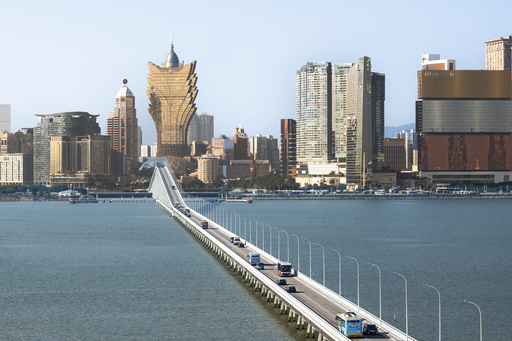
Macao, once a quiet colony of Portugal, has undergone a significant transformation since its return to Chinese sovereignty in 1999. Daniel Chao, a local coffee shop owner, recalls a childhood in a relaxed environment that has now evolved into a frenetic tourist hotspot filled with casinos and packed streets. The boisterous growth of the city, often referred to as the “Las Vegas of the East,” has not necessarily translated into sustainable development characterized by a diverse economy and active civic participation. Chao describes the changes as “crowded and highly commercialized,” reflecting a sentiment shared by many residents.
This year, Macao is set to commemorate the 25th anniversary of its reintegration into China on Friday. President Xi Jinping will visit for three days, and the city is adorned with celebratory decorations and banners. A fireworks display is also planned for the following week. Since 1999, the population of 687,000 has witnessed a remarkable economic boom, with the city evolving from a gambling enclave to a major gaming center attracting vast numbers of tourists from mainland China. The city’s GDP per capita has skyrocketed from $16,000 to an impressive $68,000, placing it on par with some of the wealthiest nations like Denmark and Australia, and surpassing Hong Kong’s figure of about $50,000.
Macao operates under a “one country, two systems” framework, similar to Hong Kong, being the only place in China where casino gambling is permitted. Its gambling industry includes resorts managed by prominent American companies like MGM Resorts, Las Vegas Sands, and Wynn Resorts. Economic growth has surged to $46 billion as of 2023 from just $6.5 billion in 1999, although there have been disruptions due to the COVID-19 pandemic and a stringent crackdown on gambling junkets that catered to high-stakes players.
While economic prosperity has surged, residents like Chao have felt the strain that accompanies such growth. His mother’s job in a casino provided a better salary and living conditions but also introduced stress and irregular hours. Chao often recalls completing his homework at dawn after his mother’s overnight shifts. As a teacher, he noticed many of his students were exhausted from late nights or dependent on paid tutoring, a consequence of their parents’ demanding casino jobs.
Chao expressed a desire to leave Macao but ultimately chose to stay, believing that leaving would come at a high cost. He stated that the city, while transformed, is not “exactly unlivable.” The influence of the Chinese Communist Party has increasingly shaped Macao’s governance, with local leaders often aligning their strategies with national objectives, a departure from the relatively hands-off approach of the past. Professor Ieong Meng U from the University of Macao anticipates greater integration of Macao with Guangdong Province over the next decade, particularly in sectors like tourism, finance, and technology.
This economic cooperation has coincided with tighter political controls, especially following the anti-government protests in Hong Kong in 2019, which prompted a crackdown on dissent in Macao as well. Various pro-democracy activities have been stifled, including the banning of vigils for the Tiananmen Square protests and restrictions on candidates in legislative elections. Last year, Macao enacted stricter national security laws, and concerns have been raised regarding press freedom, with some local outlets facing pressure to retract articles.
Activist Jason Chao, who shares the same last name as Daniel but is not related, chose to leave Macao after years of advocating for democracy. Disillusioned by the unyielding stance of officials and a civic culture reliant on personal connections over community engagement, he felt his efforts were futile. He moved abroad to study in 2017 and now works as a director for a civil society organization that assists Hong Kong migrants in the UK.
Some older residents maintain that life has improved over the past 25 years. Retiree Ka Man Chun appreciates the annual cash distributions funded by gaming taxes since 2008, which provided each permanent resident with $1,240 this year. He perceives no significant issues as long as he stays out of politics. Others, such as flower shop owner Anna Ng, commend the advancements in public security and social welfare compared to the colonial era, despite criticisms about the lack of economic diversification.
On the flip side, younger residents like Enid Ieong find themselves frustrated with the limited career and leisure opportunities available and hope to relocate to Hong Kong to join her boyfriend. She compares the government’s cash handout to compensation for the strain of living in a gaming-dominated environment. “I feel like I was born in a grand mansion, but am only responsible for sweeping the floor,” she remarked, underscoring her discontent with the status quo in Macao.

